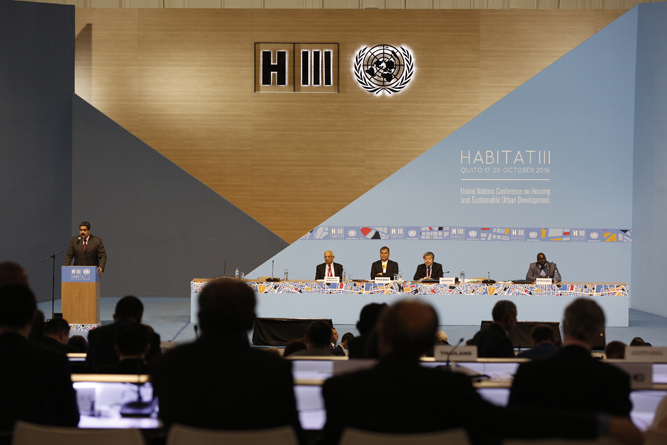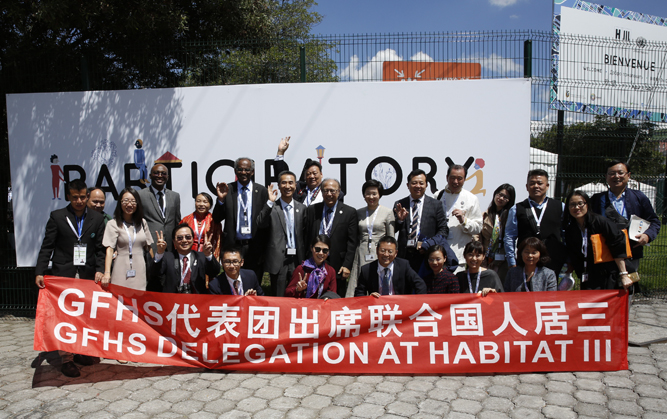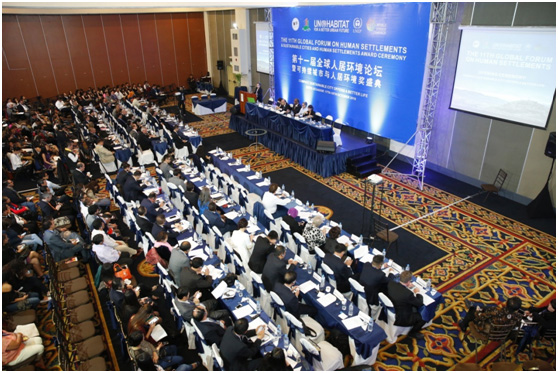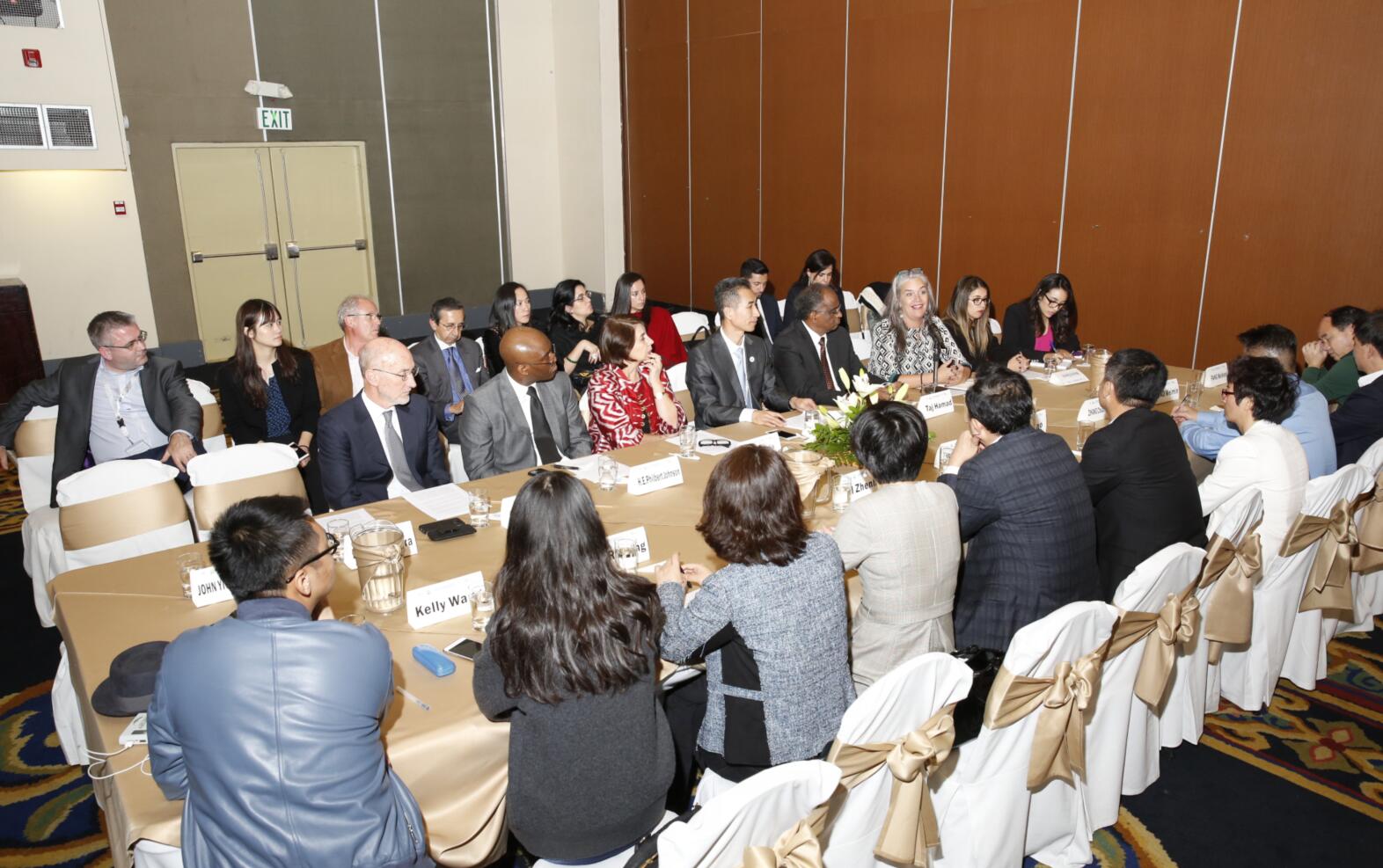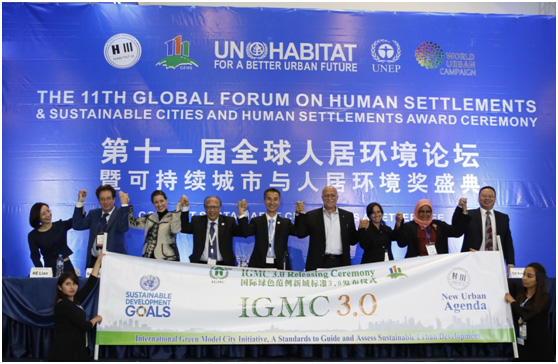As an important parallel event of Habitat III, the 11th Global Forum on Human Settlements was successfully held in Quito on October 17-18. This Forum is jointly organized by the Global Forum on Human Settlements (GFHS), the United Nations Human Settlements Programme (UN-Habitat), the United Nations Environment Programme (UNEP), the World Urban Campaign (WUC) and Universal Peace Federation (UPF). The conference was attended by more than 400 representatives, including the leaders from Ecuador and relevant countries, senior officials of the United Nations, the mayors of multinational cities, diplomatic envoys, leading enterprise leaders, experts and scholars, heads of international organizations and representatives of women and children.
The important guests attending the Forum include: Dr. Shamshad Akhtar, UN Under-Secretary-General and Executive Secretary of United Nations ESCAP ; Ambassador Anwarul K. Chowdhury, Chairman of GFHS, Former UN Under-Secretary-General and High Representative; H.E. Rosalia Arteaga Serrano, Former President of Ecuador; Hon. Mr. Fernando Alvarado, Minister of Tourism, Ecuador; Mr. Elkin Velázquez, Regional Director for Latin America and the Caribbean, UN-Habitat; Mr. Arab Hoballah, Chief, Sustainable Lifestyles, Cities and Industry Branch, UNEP; Dr. Taj Hamad, Vice Chairman of Global Forum on Human Settlements (GFHS); Mr. Lu Haifeng, Secretary General of Global Forum on Human Settlements; H.E. Mr. Philbert Johnson, Ambassador and Deputy Permanent Representative of Ghana to the United Nations; Mr. Nicholas You, Honorary Chair, World Urban Campaign; Ms. Christine Auclair, Project leader, World Urban Campaign; mayors or representatives of Vienna, Auckland, Cuenca, Mexico and other famous cities, well-known experts, famous entrepreneurs, leaders of international organizations, and representatives of teachers and students of University of Ecuador.
Ambassador Anwarul K. Chowdhury, Chairman of GFHS, Former UN Under-Secretary-General and High Representative, mentioned in his opening speech that I extend a very warm welcome to all the participants who have joined us from various part of the globe at the Eleventh Global Forum on Human Settlements (GFHS XI), now taking place on the margins of the bi-decennial United Nations Conference on Housing and Sustainable Urban Development (Habitat III) in Quito, the beautiful capital city of Ecuador.
I am honored to announce here that bearing in mind the expected outcome of Habitat III on New Urban Agenda, the mission of GFHS has now been tailored as “Committed to Sustainable Cities and Human Settlements for All”.
Then, Dr. Shamshad Akhtar, United Nations’ Under-Secretary-General and Executive Secretary of United Nations ESCAP emphasized in her speech that “currently, the growth of cities is far greater than the population increase. In Asia-Pacific, many cities are facing grave challenges of urban sprawl that is preventing people from enjoying the benefits of urbanization. The adoption of the New Urban Agenda will provide city leaders the policies, strategies and tools to manage and govern our cities, and thus create more new opportunities for our cities.” Dr. Akhtar also shared her perspectives on China’s urbanization and indicated that China is doing great in city connectivity which provides examples and references for other cities.
After this, Hon. Mr. Fernando Alvarado, Minister of Tourism, Ecuador noted that we are grateful to China for their support and investment in Ecuador where we have abundant tourism resources. First, Ecuador is at the center of the World, second, a majority part of the land is located at Amazon area, and third we have unique Galapagos Islands. Especially after this year’s earthquake, Ecuadorian government is taking full advantage of the post-quake reconstruction, and striving to develop infrastructure and sustainable tourism, which will bring great opportunities and bright future.
H.E. Rosalia Arteaga Serrano, Former President of Ecuador: I invite you to think about the concept of GLOCAL, a lexicographical neologism, which includes a new concept of life that has much to do with the theme of this particular meeting, “Compact sustainable city offers a better life.” We are GLOCAL citizens, defined like this because we are those who make use of the latest technologies, we communicate with the high speed of the most sophisticated elements that every day are renewed, which presents us with new challenges and learning. We feel that the planet is our big home, that we must take care of and protect, if we want to continue living as a human race, as a species.
The annual conference of the Forum aims to promote the implementation of 2030 Agenda for Sustainable Development and the New Urban Agenda at local and city level; provide a platform for information exchange for the global stakeholders on how to respond to the challenges of unsustainable cities, rapid urbanization and climate change, which focuses on the specific urgent urban challenges existing in Latin America and other regions, and advances sustainable urban development around the globe; highlight innovative and alternative approaches, policies and actions on compact sustainable city, and identify good practices in this regard; and contribute to promoting bilateral and multilateral exchanges and cooperation of economy and technology among cities and entities in Ecuador and other countries, particularly China, in terms of sustainable cities and responses to climate change.
In conjunction with the New Urban Agenda, centering on the theme of "Compact Sustainable Cities Offers a Better Life", this annual conference discussed in depth the following topics through high-level dialogues and technical sessions: Compact, Integrated and Connected Sustainable Cities, Cultural Heritage Conservation and Sustainable Tourism, Low Carbon Cities and New Energy Development, World Urban Movement Driving Urban Innovation, Women and Children in the Rapidly Urbanizing World. The guests delivered a series of innovative lectures and speeches, shared a number of best practices, reached consensus, bolstered cooperation and innovation, and contributed wise ideas and thoughts to the future development of compact and sustainable cities.







